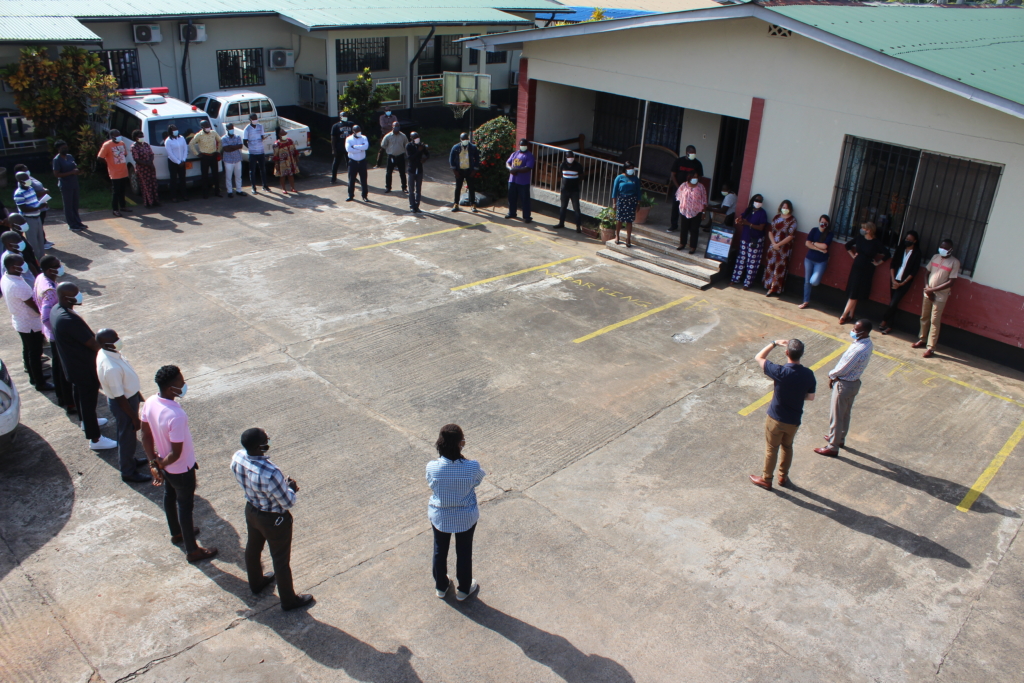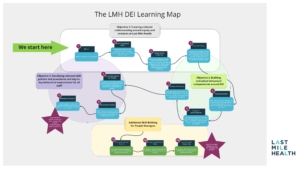In 2021, Last Mile Health strengthened our commitment to building a more just and equitable organization with the launch of a new diversity, equity, and inclusion (DEI) roadmap. The past 18 months have held several milestones along our journey toward greater equity:
- 86% of existing staff and 77% of new hires completed a new organization-wide DEI training series.
- We opened a new global office in Accra, Ghana, as an important step in shifting our centers of power and decision-making to the continent and bringing operational support closer to our country teams—and as of August 1, 23 staff are based in the Accra office, including Chief Technical Officer Divya Nair and Naa Adorkor Yawson, Managing Director, Operational Services.
- We’ve conducted a psychological safety assessment with our Leadership Council, created new spaces for staff engagement with leadership, and made and honored our commitment to report quarterly to the Board of Directors on DEI progress.
To assess and ensure progress in this work, we conducted our second staff-wide inclusion survey earlier this fiscal year, gathering quantitative and qualitative feedback to measure against the benchmarks established in our first survey in 2020. The survey results show that we’re making progress—and offer key insights into what we can do better.
Turning feedback into action
Our inclusion survey results suggest that staff believe Last Mile Health values and prioritizes DEI—and they feel empowered to demonstrate our organizational values. Staff largely believe DEI is a strategic priority, with some team members sharing that more investment is required to realize this priority, particularly in ensuring DEI values are mainstreamed into our organizational culture and programming. They pointed out areas where additional work must be done and highlighted a need to bring more specialized expertise on the team, including community engagement and gender mainstreaming and social inclusion specialists. In response to these needs, we have integrated DEI into all team workplans in fiscal year 2024 (July 1, 2023—June 30, 2024) by working with our external consultants at The Better Org to support the development of strategic objectives and key results that prioritize DEI. Our goal is to translate DEI into a priority for all teams—including in how financial resources are allocated.
Staff also noted progress in the makeup of leadership. Despite these gains, however, some staff still feel inclusion in planning and decision-making is dependent on an individual’s position and their geographical proximity to leadership: for example, staff members working in rural job sites in Liberia indicated they felt they had less input into critical decisions being made at the Liberia HQ Monrovia office. We are actively working to address this, providing increased opportunities for staff across the organization to meet with leadership in person at every Last Mile Health office and actively involving all teams in the annual planning process through country-level retreats.

Last Mile Health staff at the Accra office during a visit from Chief Programs Officer James Nardella.
The survey results show progress in creating a shared understanding and language for DEI across the org, and qualitative data suggests staff-wide DEI training was the main contributor. “It’s remarkable to see how we’ve continued to refine our training approach and implement it for another cohort of new staff members,” said Dan Owens, Director of Business Development in Boston, US, and a member of the DEI committee. Staff found the training impactful, expressing interest in refresher training.
Data also show that as Last Mile Health has grown from its roots in Liberia to include additional country programs in Ethiopia, Malawi, and Sierra Leone—as well as a global office in Ghana—staff are eager to learn more about their colleagues’ cultural contexts. Considering this data alongside feedback from the Leadership Council assessment, we are committed to prioritizing culture in upcoming training and communications activities.
We’re excited to see investment in DEI work continuing to grow. “We should look at collectively owning the DEI agenda by looking at DEI with an outside the box approach—not limiting it to the training examples received but all aspects of work and our lives,” reflected Charles Armah, Director of Financial Planning and Analysis in Accra.
Looking ahead
We have used the data from our inclusion survey to help shape our organizational DEI priorities for the next fiscal year, updating our DEI roadmap to reflect new goals and plans. The roadmap—available to all staff, as well as publicly accessible on our website—will continue to be our central location to track commitments and progress. Regular updates on the work underway are also shared with staff every quarter in our internal newsletter.
Transparently sharing our progress and shortcomings—as well as the plans to address areas for improvement—is key. “We need to talk more about DEI impact, and the way this internal work ties into our external mission,” said Theresa Dei Dzanie, Director of Talent Acquisition in Accra. “It is aligned with the change we want to see in the world.”
Guided by our inclusion survey results, our priorities this fiscal year will include:
- Holding cultural training and providing learning opportunities
- Prioritizing DEI as part of a comprehensive onboarding package for new staff
- Sharing more consistent DEI communications, both internally and externally
- Sharing disaggregated data from employee surveys with staff to increase transparency
- Leverage disaggregated data to assist team leaders in developing targeted DEI-related activities, including: integrating gender mainstreaming and social inclusion into priority projects; creating safe spaces for team dialogue; developing avenues for increased inclusion in planning and decision-making.
We continue to work with The Better Org to support the development of strategic objectives and key results that prioritize DEI. Much much work remains to be done: continual reflection, assessment, and work are key to maintaining our commitment to justice and equity. This work is critical to our organization—both for our staff and for the community health workers and patients our programs support.
“At the core, our work is to address inequity in healthcare access. It also means that we seek to ensure that the billions who are excluded from access to quality healthcare are included,” said Peter Kaddu. “As we seek to address these challenges, it is important that we avoid perpetuating the very injustices and practices we are seeking to address.”






